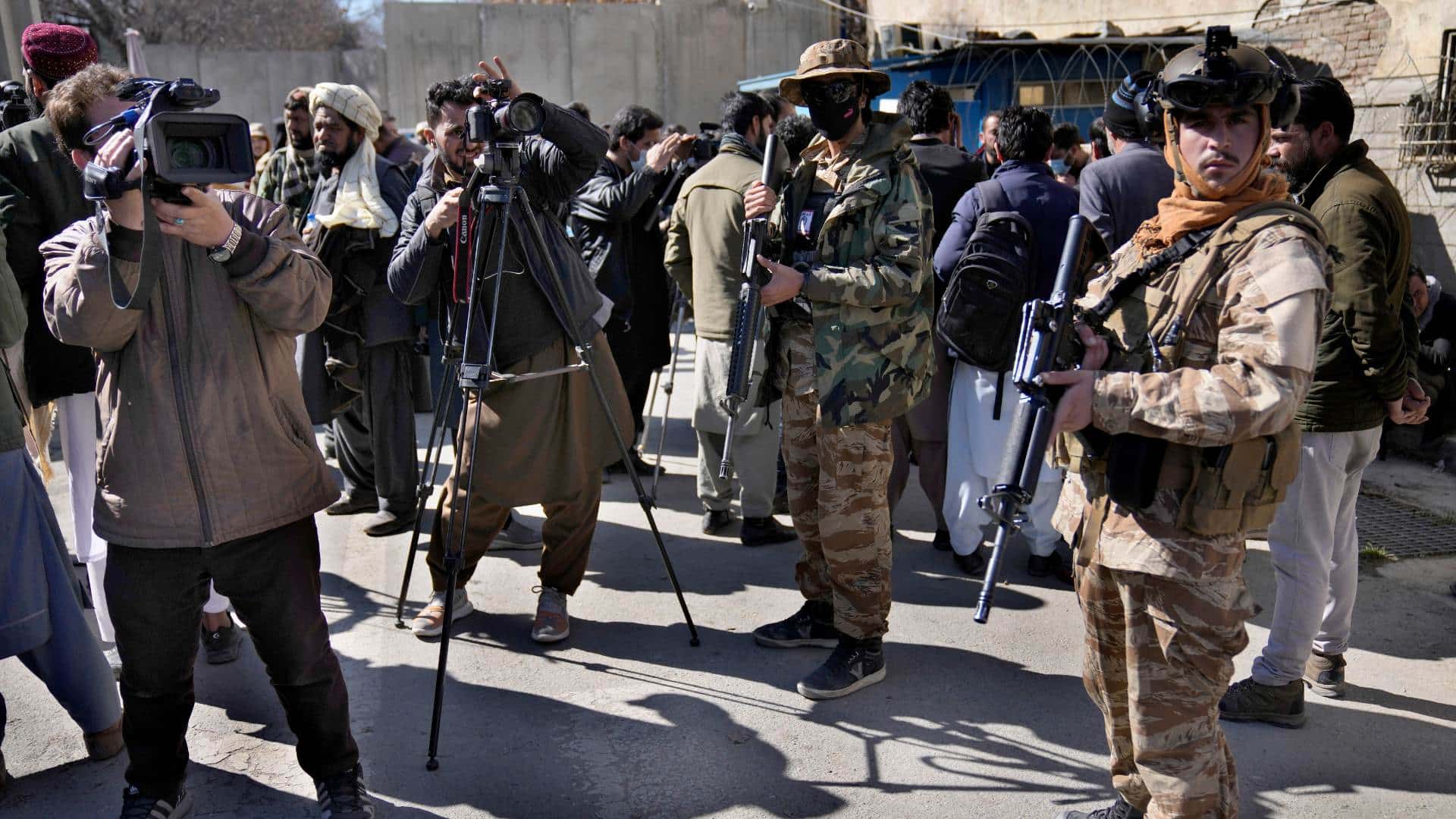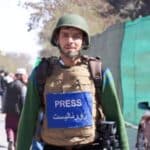May 3 will mark World Press Freedom Day, reminding us that despite the important work journalists do, in many places it is difficult for them to do that job.

Afghan cameramen cover a protest against U.S. President Joe Biden in Kabul, Afghanistan, 15 February 2022. (AP Photo/Hussein Malla)
Editor’s Note: May 3 marks World Press Freedom Day, first established by the United Nations in 1993 as a reminder to governments and citizens of the important work done by journalists around the world and the need to protect those journalists from harassment or harm.
To mark the day, News Decoder is publishing three stories. First we start by republishing today an article we first ran in May 2023 by Rafiullah Nikzad, a former reporter in Kabul, that decodes the mass exodus of journalists from Afghanistan and the aftermath of severe censorship for those who remain.
Just this month, the Taliban announced plans to restrict –– and possibly even block –– Facebook for Afghani citizens. Widely used by news outlets across the country as a means of disseminating information, a restricted Facebook is only part of a wider censorship against the press and journalists attempting to reach civilian audiences.
Afghani journalists have faced prison sentences for “cooperating with foreign media,” restrictions on female voices in the media and even limited access to YouTube channels, according to reporting from the Committee to Protect Journalists. Since the Taliban rose to power in 2021, Afghani journalists have seen drastic measures taken against their ability to report the truth.
We launched Decoder Replay to help readers better understand current world events by seeing how our correspondents decoded similar events in the past.
On May 2, News Decoder will publish a story by student author Joshua Glazer that examines the question of who is a journalist and therefore worthy of press protections. On May 3, we will publish an article by correspondent Helen Womack that looks at the continued imprisonment of Wall Street Journal reporter Evan Gershkovich in Russia and Vladimir Putin’s use of arrest and imprisonment as a tool of power and oppression.
Ahmad Naweed Kawish was a journalist in Afghanistan until the Taliban retook control upon the departure of U.S. troops in August 2021. She fled in May 2022 for Pakistan.
“I made a report about the sexual assault of a member of the Taliban group on a young girl in Parwan province of Afghanistan,” Kawish said. “Unfortunately, I was threatened with death by the Taliban and forced to flee Afghanistan.”
Afghanistan has become a dangerous place for reporters. Many, like myself and Kawish, my companion, have fled. But many others continue to do their jobs in increasingly dangerous circumstances, especially for women.
I have been working as a journalist since 2019. In August 2021, I was arrested and beaten by the Taliban while preparing a report along with Kawish. They released us two hours later. I was again threatened with arrest by the Taliban because of previous reports that I had prepared in support of popular uprisings. So I fled Afghanistan for Pakistan in April 2022. I am now in Kosovo.
An exodus of journalists from Kabul
The Taliban has shut down the offices of the BBC, Deutsche Welle, Voice of America and other international media. These news organizations now report from outside of Afghanistan.
According to Reporters Without Borders, out of 547 media outlets that were operating in Afghanistan before the United States pulled out, 219 media outlets have stopped their activities and with the closure of these media outlets, about 7,000 media employees — 2,100 of whom are women — have lost their jobs.
The United Nations expressed concern about freedom of expression in Afghanistan on World Press Freedom Day on May 3, and asked the Taliban to respect freedom of expression.
Richard Bennett, special rapporteur of the United Nations Human Rights Council for Afghanistan, noted on Twitter the efforts of the journalists who continue to report in Afghanistan despite the risks.
“I ask the Taliban to respect free, pluralistic, independent and inclusive media as the right of all Afghans,” Bennett wrote.
When reporting on government is a crime
Freedom of expression in Afghanistan was considered one of the great achievements of the U.S. deployment of troops there, but that freedom narrowed after the Taliban retook control over the country and imposed many restrictions on the media and journalists.
The United Nations Assistance Mission in Afghanistan has said in a statement that currently Afghan journalists who continue to work there do so under an atmosphere of threat and fear.
Like Kawish, Abdullah Hamim worked as a journalist in Afghanistan for nearly 10 years until he, too, had to flee to Pakistan. But that’s not his real name. Because he still fears for his safety, he asked that his real name not be used.
Hamim said that while freedom of speech is considered one of the important parts of a society it is limited in Afghanistan. Whenever there is freedom of speech, it can bring a positive impact on the thinking of a society and the institutionalization of good cultures, he said.
Sohailla Yousofi worked in independent media in Kabul after the Taliban came back to power. But she too fled for Paris. “There is no law for freedom of expression in the Taliban government,” Yousofi said. “Journalists are arrested and imprisoned without any crime.”
In the past, she said, journalists could freely report on the corruption of government officials. “Now there is no possibility that we choose a subject without the order of the Taliban group,” Yousofi said. “If the international organizations that support journalists do not support us and the media, we will be removed from society every day and the day will come when the other realities of the society will be hidden.”
Three questions to consider:
- Why is it so dangerous to be a journalist in Afghanistan?
- Why do people try to report news even if they could be arrested or beaten?
- What, if any, protections are there for journalists in your country?

Rafuillah Nikzad is a former reporter with Khurshid TV in Kabul and has also reported for Voice Independent London. Through journalism, he wants to portray the truths of the society and stop oppression and injustice.
